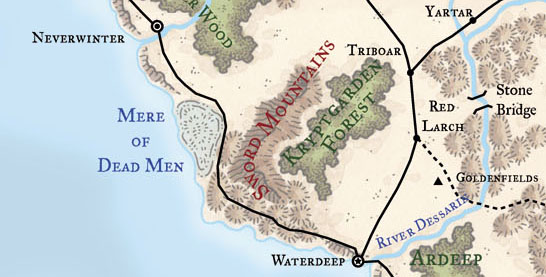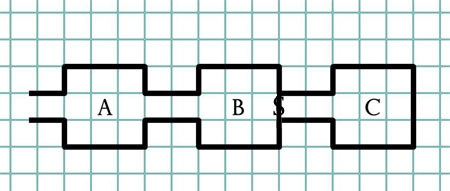There’s been a recent memetic trend of attempting to defend the idea of railroading your PCs by, first, claiming that a bunch of stuff that isn’t railroading is a “railroad” and then using that claim to conclude that railroading isn’t bad and we should all just stop worrying about it.
It’s as if I said, “Racism isn’t all bad. After all, apple pies are totally racist. But they taste delicious, right?” It sounds perfectly reasonable until you notice that the bit about apple pies being racist is bullshit.
One thing to keep in mind is that the metaphorical use of the verb “railroad” is not a piece of terminology unique to RPGs. It’s an English word dating to 1884 that means, “To force someone into doing something by rushing or coercing them.” Whenever you see someone trying to defend railroading by claiming that it includes a bunch of techniques that don’t include forcing the players to do something they don’t want to do, they’re abusing the terminology. The term “railroading” in this context has an inherently negative connotation, and it’s simply not useful to attempt to redefine the English language so that you can use the term “railroad” to describe some completely different technique that isn’t railroading.
What would be useful, on the other hand, is a new term that we could use to describe the body of techniques which limit player choice. We’re going to call them chokers. (Because they create chokepoints in your scenario design.)
Limiting player choice, you’ll note, is distinctly different from negating their choices. While chokers can certainly be abused in order to constrain choice to the point where the GM is enforcing their preconceived outcome by default, imposing creative restraint upon a given situation creates interest and variety.
For those particularly paranoid about limiting the choices available to a PC, it may be useful to note that these chokers will also appear organically and spontaneously through play. The natural world, after all, often surrounds us by barriers. (For example, I am currently sitting in my office. The only way I can easily leave my office is through the door. I could also climb out the window. I might be able to hack my way through the wall, but that’s unlikely. The nature of the room has limited my choices.)
Being aware of these chokers will not only allow you to take advantage of their strengths, but also avoid their perils. The Three Clue Rule is an example of that: A breadcrumb-style mystery scenario is formed from a series of chokers, with each clue providing a very narrow and very specific path that leads to the next clue. The Three Clue Rule simply adds more clues, removing the choker and allowing the scenario to proceed smoothly.
THE ROAD

Let’s say that the PCs want to travel from Waterdeep to Neverwinter. Why they want to do this is largely irrelevant: Maybe they just learned that the man who killed their father has fled to Neverwinter. Or they’re traders who’ve heard that their Tethyrian textiles will fetch a good price there. Or maybe they just randomly decided to go there at the end of the last session.
So they look at the map and they say, “Hey. Let’s take the road.”
The road is a natural choker, narrowing their experiences to a sequence of literally linear events. For example, you could look at this journey from Waterdeep to Neverwinter and simply prepare it as:
- As they enter the Sword Mountains, they’re attacked by the Blood Shield Bandits.
- Black water kappa will emerge from the Mere of Dead Men as they pass it.
- North of the Mere of Dead Men they’ll encounter Benedict, an itinerant merchant with a beautiful daughter. The axle of their wagon has broken.
Insofar as the road is the natural choice for traveling from Waterdeep to Neverwinter, the choice of going to Neverwinter triggers this specific sequence of events.
Of course, one can loosen the choker if the PCs can choose from a variety of routes. For example, instead of taking the road from Waterdeep to Neverwinter, the PCs could book travel on a ship. (Of course, the journey by ship merely presents a different set of linear experiences.)
It should be noted, however, that the mere existence of multiple routes is often a false choice unless the choice between routes includes an incomparable difference. For example, if the PCs are concerned with speed and the only difference between the journey by sea and the journey by road is the amount of time they take, then there is no real choice: There’s only a calculation of which route will get them there faster. (See The Importance of Choice for a complete discussion of this.)
What I think is interesting about literal roads, however, is that they usually contain an incomparable choice by their very nature. For example, imagine that the PCs are going from Waterdeep to Triboar. There’s only one road, so that’s the way they have to go, right? Except, of course, they could also choose to journey cross-country. The cross-country journey would be slower, but it would also mean avoiding whatever troubles there might be on the road. (The choice between speed and avoiding the events on the road is the incomparable.)
Of course, not all roads are literal roads. Another metaphor for this sort of choker is a bullet in flight: The PCs load themselves into a gun and then pull the trigger. The choice of pulling the trigger is theirs, but once they have done so their flight will logically and naturally take them through a sequence of experiences. As long as they choose to remain upon the bullet, the bullet will continue to fly. You can either take this opportunity to show them some awesome stuff midflight or you can challenge them in order to make the decision to stay on the bullet a meaningful one.
A third way of understanding this choker is “looking out the train window”. Once they’ve made the decision to get on the train, it’s not necessarily impossible to get off before the next stop, but they’d have to put considerable effort into doing so. The metaphor of the train, however, also highlights the ability to create a rich scenario full of complex choices on the train: There may be a linear sequence of events rushing past the windows in the background, but that doesn’t need to be true of the immediate experiences of the PCs. (Maiden Voyage, a D20 adventure by Mike Mearls, is an excellent example of this type of scenario.)
Where you can get yourself into trouble is assuming that the PCs will take a road when they have no need to do so. (Or, worse yet, strong reasons for not taking the road.) For example, the Horror on the Orient Express campaign for Call of Cthulhu ironically makes it a bad idea for the PCs to take the Orient Express. (And then doubles down later in the campaign by, in fact, making it quite difficult for the PCs to stay on the train.)
MECHANICAL GATES
A mechanical gate exists whenever the PCs need to succeed on an action check in order to do a thing or go to a place or otherwise have a particular experience.
The simplest example of this is a secret door in a dungeon:

If the PCs fail to detect the secret door in Area B, then they will never discover Area C.
A mechanical gate like this is only a problem, of course, if Area C is of vital importance. For example, if Area C is the only place you can find the cure for the Princess’ disease. If the content in Area C is non-essential, on the other hand, then it simply serves as an optional reward for PCs who successfully leap the mechanical hurdle.
A common example of the mechanical gate is the breadcrumb trail approach to mystery scenario design: Every clue is necessary to reach the next section of the scenario, and thus every skill check to find a clue is a mechanical gate which must be passed through in order for the scenario to succeed. (This is the broken scenario structure which the Three Clue Rule seeks to fix. It’s like adding additional routes by which the secret chamber in the dungeon can be found.)














It appears you missed putting in the link to the Three Clue Rule.
I’m going to pretend I did that on purpose in order to demonstrate how easily having only a single route of access can fail. Finding alternative methods of accessing the Three Clue Rule article (Google searches, scanning the archives, etc.) is left as an exercise for the reader.
>innocent whistling<
I’m guessing the 5th part is not written/published yet. Really enjoying reading through this series, this latest article is particularly interesting to me as I often use chokers to guide players to interesting areas. I remember I wanted to do a soft reveal of the demon king who was trying to create a stronghold in the mortal realm to them. They successfully held off the demon army assaulting the walls, but quickly dispatched any demons they might have questioned, they destroyed the scrying mirrors the demonic generals were using to communicate with the king without looking in them. They quickly dispatched the possessed priest channeling the demon king after silencing him to prevent him casting any spells. They burned the note left for them by a mysterious cloaked figure (a dispossessed elven archmage trying to stop the demon king) without reading it in case it was a trap. I was actually despairing of ever finding a way to communicate their objective to them.
Then they decided it would be a good idea to scout out the other side of the portal. They sent two members in, a slow dwarven fighter and a speedy monk. The Balor used power word stun and incapacitated the fighter, the monk tried to fight the Balor and was quickly captured. The rope the party had tied round the fighter remained taut due to the nature of the gate and the two scouts were taken to the demon fortress where they ultimately escaped after overhearing the demon king’s plans.
I should add that there were several points earlier in the adventure where I’d left much more subtle leads for them to find out about the demon king’s plans before he invaded the material plane, but the players were more cautious than I expected. The Dwarven and Elven kings were dethroned and new, hostile regeants put in their place, an underling of the demon king attacked them, but he was allowed to escape while they dealt with his bodyguard and then failed to question his bodyguard. Several groups of robed men were written off as “probably monks” and the Order of the Red Hand was written off as just some cult.
They seemed to enjoy their tour of the small country I’d mapped out though. It just goes to show how hard it is to give players a hook sometimes. I don’t know what I’d have done if the whole party had stepped through the portal or if the two scouts had made their saves and fled, or even if the monk had fled to get the others as the party probably could have killed the Balor.
It’s interesting to read these articles on railroading, mostly because I see a lot of past places I’ve been as a GM. When you mention the claim of something as a railroad which is not and then a defense of the practice, I see an argument I currently make.
I have claimed “My players don’t like sandboxes much, they prefer to see a few rails.”
By which I mean through trial and error I’ve found that my players like to have a central, linear storyline that they can pursue in the absence of interest of anything else. They’re pretty casual gamers, and knowledge of a “Plot this way!” signpost is incredibly comforting to them. They feel safe in then choosing other avenues when they want because they know they always have a clear line of sight to a pre-ordained path.
I do note that this is a very different definition of railroad than what you’ve used here though. In fact, it tends to encourage the opposite. Knowledge of a fallback or easy mode gives them the confidence to try different things, and it often leads to a very non-standard resolution.
Chokers? My friends would spend the next 12 sessions making BDSM choker jokes if I introduced this concept to them.